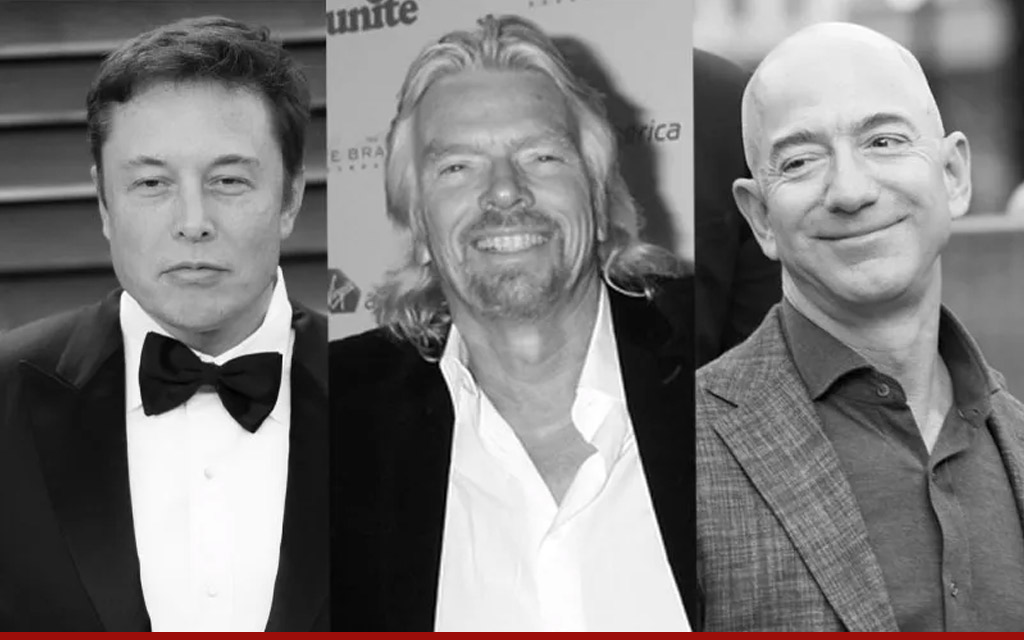Lewis and Clark, Ernest Shackelton, Roald Amundsen — they just couldn’t sit still and not dream of uninhabited places. George Mallory, a climber who lost his life on Everest, has earlier been asked why he climbed it. He answered, “because it is there”. (That’s often wrongly attributed to Sir Edmund Hilary.)
Today we can see the distant edges of two new territories ripe for new kinds of exploration–one physical, one virtual. One is in outer space, the other in digital space. Both are fueled by big egos, big dreams, and the same pioneering passion for the unexplored.
Three brash (and that’s the kind word) entrepreneurs: Richard Branson, Jeff Bezos, and Elon Musk have set their sights set on space travel, each with a different variation on the theme. According to CNN, the trio has a combined net worth of $400 billion, roughly the size of the GDP of the nation of Ireland. And they’re spending much of it on space travel.
Musk is operating a commercial service under contract for NASA to ferry people to and from space. Musk is also interested in sending people to Mars. With his contracts, and despite the fact that he personally has thus far remained grounded, Musk may be farthest along.
Bezos is currently dreaming of space colonization. He imagines living and working in space, in the likely event that Earth reaches a point where it’s a less desirable habitat. He is so eager to make progress that he seems to be trying to bribe NASA to let him help build the next lunar lander after his Blue Origin space company lost out to Musk’s SpaceX on the recently-awarded initial contract.
Branson’s focus is also on space tourism, giving new heights to the name Virgin Galactic. Their stories of conquering new lands will be read by children of the next generation

Back on Earth, the pioneers are heading to the metaverse–also to colonize, set up communities and invite tourists to visit. Whether it’s the gamer community, the NFT/crypto folks, or AR and VR developers, it’s a virtual land grab for engagement. The big idea is to create completely immersive worlds that exist only digitally. Like in space, you might work there, play there, be entertained or set up shop. Like space, the metaverse has been talked about as a place where new rules can be written, and new values and norms explored.
Just this month Mark Zuckerberg’s company, Facebook, announced it would be heading to the metaverse in a big way. According to Zuckerberg, the future of Facebook’s community is in the metaverse. For the moment, the only glimpse we have into that vision is through Oculus Rift VR glasses, owned by Facebook, and the variety of experiences offered through them.
While Zuckerberg hopes to be Master of the Metaverse, he is far from alone and far from the most experienced. Companies like Virbela are digital-first from their roots, whether it’s to learn, play or meet. Even their own employees trudge to work each day in a digital twin of the physical world. MootUp, a 3D immersive environment, just partnered with Verizon’s Blue Jeans (software kind of like Zoom) to offer enterprises the opportunity to mingle in the metaverse. Niantic, the maker of Pokemon Go, has embarked on the boldest vision of the metaverse to date. It is building an AR replica of the entire planet, offering visitors a chance to experience the real world, but augmented with digital information.
An important part of the metaverse is that its shingle reads “open for business.” Whether it’s a concert, fashion show, disco evening, learning symposium, or something else, metaverse companies are encouraging brands and creators to offer unique experiences in their digital worlds. Companies with services like Fortnite, Minecraft, and Animal Crossing, though their roots are in gaming, have already attracted big investment dollars and big sponsorship dollars from brands.
One of the premiere metaverse destinations began life as a children’s game. Early on, Roblox adopted a few tenets that turn out to be somewhat foundational to a metaverse. It makes its users part of its revenue-sharing model. As users create new games on the platform, they open the platform to other brands that want to build worlds in Roblox. There’s also a MIM-currency to spend (for Magic Internet Money) and Roblox also has given its audience agency to dress, groom and raise their own avatars, which proved wildly popular. Companies including Nike, Disney, Warner Bros., and Gucci are actively setting up experiences there.
The cost of exploring the metaverse is magnitudes lower than space exploration, of course, but what they have in common is the lure of uncharted areas. The unknowns are vast. Of course, just like with the explorers of yore, the course of history will inevitably be altered by greed, motive, and human error. But make no mistake, the Moon and the Metaverse are open for business.
Source: https://techonomy.com/2021/07/moon-metaverse-common/




